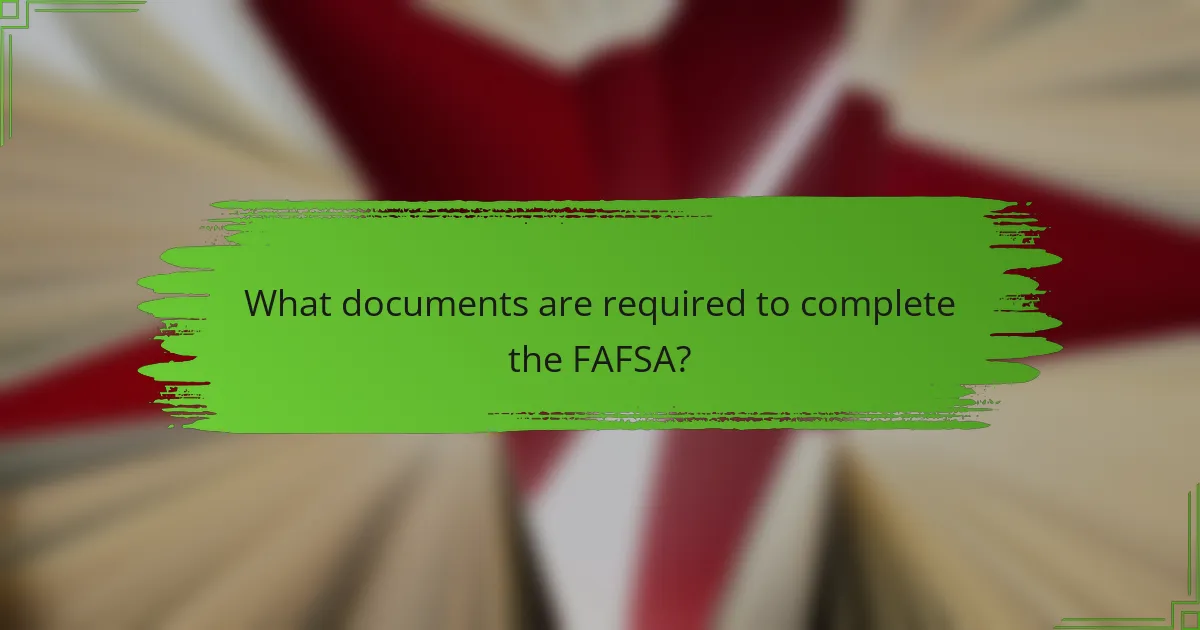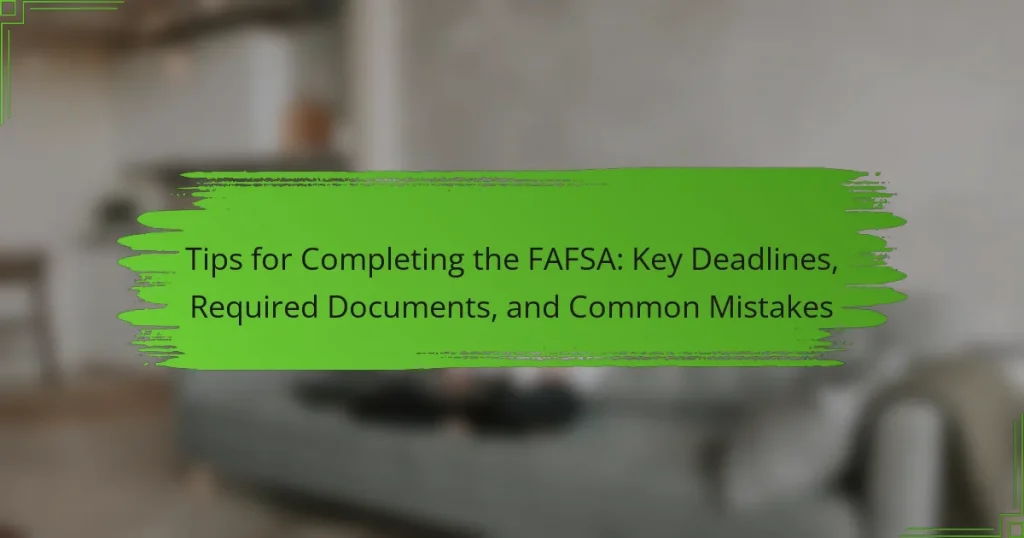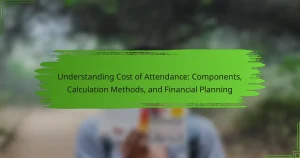
What is the FAFSA and why is it important?
The FAFSA, or Free Application for Federal Student Aid, is a form used to apply for financial aid for college. It is important because it determines eligibility for federal grants, loans, and work-study programs. Completing the FAFSA can unlock significant financial resources for students. In the 2021-2022 academic year, approximately $120 billion was awarded through federal student aid programs. This aid helps students cover tuition, fees, and living expenses. Additionally, many states and colleges require the FAFSA for their own financial aid programs. Missing the FAFSA deadline can result in lost funding opportunities. Therefore, timely completion is crucial for maximizing financial support for education.
How does the FAFSA process work?
The FAFSA process involves several key steps to apply for federal student aid. First, students must gather required documents such as tax returns and Social Security numbers. Next, they complete the FAFSA form online at the official website. The form collects financial information to determine eligibility for aid. After submission, the Department of Education processes the application. Students receive a Student Aid Report that summarizes their information. This report helps schools determine the amount of aid awarded. Deadlines for submission vary by state and institution, making timely submission crucial. Accurate and complete information is essential to avoid delays in aid processing.
What steps are involved in completing the FAFSA?
To complete the FAFSA, follow these steps. First, gather necessary documents such as your Social Security number, tax returns, and bank statements. Next, create an FSA ID at the Federal Student Aid website. Then, access the FAFSA form online and begin filling it out. Input your personal information, including your financial details. After completing the form, review all information for accuracy. Finally, submit the FAFSA by the deadline to ensure eligibility for financial aid.
What role do federal and state governments play in FAFSA?
Federal and state governments administer the Free Application for Federal Student Aid (FAFSA). The federal government provides financial aid through grants, loans, and work-study programs. It establishes eligibility criteria based on financial need and other factors. The U.S. Department of Education oversees the FAFSA process. State governments also play a role by offering their own financial aid programs. They may require FAFSA completion to access state-specific grants or scholarships. Each state has its own deadlines and criteria for aid distribution. Together, federal and state governments ensure that students have access to financial resources for higher education.
What are the key deadlines for FAFSA submission?
The key deadlines for FAFSA submission are typically June 30 for the academic year. Some states and colleges have earlier deadlines for state aid or institutional aid. For the 2024-2025 FAFSA, the application opens on October 1, 2023. Submitting the FAFSA early increases the chances of receiving aid. Checking specific state and college deadlines is essential for timely submission.
When should you start the FAFSA application process?
You should start the FAFSA application process as soon as it opens, which is typically on October 1 each year. Completing the FAFSA early can increase your chances of receiving financial aid. Many states and colleges have limited funds that are awarded on a first-come, first-served basis. Therefore, applying early ensures you meet any institutional or state deadlines. The FAFSA must be submitted by June 30 of the academic year for which you are applying for aid. However, it’s advisable to check specific deadlines for your state and institution.
What are the consequences of missing FAFSA deadlines?
Missing FAFSA deadlines can lead to significant consequences for students seeking financial aid. Students may lose access to federal grants, loans, and work-study opportunities. This can result in higher out-of-pocket education costs. Additionally, some states and colleges have their own deadlines. Missing these can further limit available aid options. Students may also face delays in receiving financial aid, affecting their ability to enroll. According to the U.S. Department of Education, timely submission is crucial for maximizing aid eligibility. Therefore, understanding and adhering to deadlines is essential for financial planning in education.

What documents are required to complete the FAFSA?
To complete the FAFSA, specific documents are required. These include your Social Security number, tax returns, and W-2 forms. If you are a dependent student, you will also need your parents’ tax information. Bank statements and records of investments may be necessary as well. Additionally, you might need documentation of untaxed income. These documents help ensure accurate financial information is submitted. The FAFSA uses this information to determine your eligibility for federal student aid.
What personal information do you need for the FAFSA?
To complete the FAFSA, you need personal information such as your Social Security number. You also need your driver’s license number, if applicable. Additionally, you must provide your tax information from the previous year. This includes your income and any assets. If you are a dependent student, you will need your parents’ information as well. The FAFSA requires details about your family’s financial situation. Accurate information is crucial for determining your eligibility for financial aid.
What financial documents are necessary for the FAFSA?
To complete the FAFSA, applicants need specific financial documents. These include the previous year’s federal tax returns. Additionally, W-2 forms and other income statements are required. Applicants should also have bank statements on hand. Information about untaxed income is necessary as well. This includes child support and veterans benefits. Social Security numbers for all family members are needed too. Finally, the FAFSA requires the applicant’s driver’s license number if applicable.
How do you handle special circumstances in your FAFSA application?
To handle special circumstances in your FAFSA application, you should provide detailed explanations of your situation. Special circumstances include job loss, medical expenses, or changes in family income. You can report these situations directly on the FAFSA. Additionally, you may need to submit a request for professional judgment to your financial aid office. This request allows for a reevaluation of your financial aid eligibility. Supporting documentation, such as tax returns or letters from employers, may be required. Each college’s financial aid office has specific procedures for handling these requests. Therefore, it is essential to contact them directly for guidance.
What are the differences between federal and state requirements for FAFSA?
Federal requirements for FAFSA primarily focus on determining eligibility for federal financial aid. This includes providing information about income, assets, and family size. Federal guidelines are uniform across all states.
State requirements for FAFSA can vary significantly. Each state may have additional criteria or deadlines for state financial aid programs. Some states require specific forms or have unique eligibility rules.
For example, states like California and New York have their own financial aid applications alongside FAFSA. Additionally, some states may prioritize applicants based on residency or academic performance.
Understanding these differences is crucial for maximizing financial aid opportunities. Students should check their state’s education department website for specific requirements. This ensures they meet both federal and state obligations when applying for financial aid.
Are there additional documents needed for state financial aid?
Yes, additional documents may be needed for state financial aid. Each state has its own requirements. Commonly requested documents include tax returns, proof of income, and residency verification. Some states may ask for specific forms or additional information. Always check your state’s financial aid website for precise requirements. This ensures you submit all necessary documentation on time.
How do institutional requirements vary from federal and state guidelines?
Institutional requirements differ from federal and state guidelines in their specificity and scope. Federal guidelines, such as those outlined in the FAFSA, provide a baseline for eligibility and financial aid calculations. State guidelines may add additional criteria based on local policies and funding availability. Institutions often establish their own requirements that reflect their mission and the needs of their student populations. These institutional requirements can include additional documentation or specific deadlines that are not covered by federal or state guidelines. For example, some colleges may require tax returns from previous years, while others may not. This variation can affect students’ eligibility for aid and the amount they receive. Understanding these differences is crucial for students when applying for financial aid.

What are common mistakes to avoid when completing the FAFSA?
Common mistakes to avoid when completing the FAFSA include providing incorrect Social Security numbers. Accurate identification is crucial for processing. Another mistake is failing to use the IRS Data Retrieval Tool. This tool helps ensure accurate income reporting. Omitting information about certain assets can also lead to issues. All assets must be reported to avoid discrepancies. Additionally, not signing the FAFSA can delay processing. Both student and parent signatures are required. Missing deadlines is another significant error. Timely submission is essential for maximizing financial aid eligibility. Lastly, neglecting to update the FAFSA if circumstances change can result in incorrect aid amounts. Keeping information current is vital for accurate assessments.
What errors frequently occur in FAFSA applications?
Common errors in FAFSA applications include incorrect Social Security numbers, misspelled names, and inaccurate income reporting. Applicants often confuse parent and student information, leading to mismatches. Additionally, failing to sign the FAFSA or missing deadlines results in processing delays. Many applicants overlook required documents, which can hinder approval. Mistakes in tax information, like using estimates instead of actual figures, are frequent. Lastly, not updating information for changes in circumstances can affect eligibility. These errors can significantly impact financial aid outcomes.
How can incorrect information affect your financial aid?
Incorrect information can lead to reduced financial aid eligibility or denial. The FAFSA relies on accurate data for determining aid amounts. Errors can cause delays in processing applications. Inaccurate income figures may result in lower aid awards. Misreporting household size can also impact aid calculations. Additionally, incorrect Social Security numbers may lead to application rejections. Students may need to appeal decisions if incorrect data affects their aid. Ensuring accuracy is crucial for maximizing financial assistance.
What are the most overlooked sections of the FAFSA?
The most overlooked sections of the FAFSA include the asset reporting section and the dependency status question. Many applicants fail to report savings, investments, and other assets accurately. This can lead to underestimating financial need. The dependency status question is often misunderstood. Some students may incorrectly assume they are independent when they are not. This can affect the amount of aid received. Additionally, the FAFSA allows for the reporting of certain expenses, such as child support paid. Ignoring these can also impact financial aid eligibility. These sections are crucial for an accurate assessment of financial aid.
How can you ensure a successful FAFSA submission?
To ensure a successful FAFSA submission, complete the application accurately and on time. Use the official FAFSA website to access the application. Gather all necessary documents, including tax returns and Social Security numbers. Fill out the form carefully, double-checking for errors. Submit the FAFSA before the deadline to avoid missing financial aid opportunities. After submission, confirm receipt by checking your email for a confirmation. Review your Student Aid Report for any discrepancies. Correct any issues promptly to maintain eligibility for aid. Following these steps increases the likelihood of a successful FAFSA submission.
What tips can help streamline the FAFSA completion process?
Start the FAFSA early to give yourself ample time for completion. Gather all required documents in advance. These documents include tax returns, W-2 forms, and Social Security numbers. Create an FSA ID for easier access and submission. Use the IRS Data Retrieval Tool for accurate income reporting. Double-check all information for accuracy before submission. Keep track of deadlines to avoid missing opportunities. Consider seeking help from school counselors or financial aid offices.
What resources are available for FAFSA assistance?
FAFSA assistance resources include the Federal Student Aid website, local financial aid offices, and community organizations. The Federal Student Aid website offers comprehensive guides and FAQs. Local financial aid offices provide personalized help with applications. Community organizations often host workshops and informational sessions. Additionally, the FAFSA helpline is available for direct inquiries. These resources ensure applicants receive accurate and timely assistance.
What are the best practices for following up on your FAFSA status?
To follow up on your FAFSA status, regularly check the FAFSA website. Log in using your FSA ID to view your application status. Contact the financial aid office at your school for specific inquiries. Keep track of any required documents or additional information they may request. Allow a few weeks for processing after submission before following up. Use the contact information provided on the FAFSA site for questions. Confirm that your email and phone number are up to date for communication. Staying proactive ensures you receive timely updates on your financial aid eligibility.
The main entity of this article is the Free Application for Federal Student Aid (FAFSA), a crucial form for students seeking financial assistance for college. The article provides essential tips for successfully completing the FAFSA, including key deadlines, required documents, and common mistakes to avoid. It emphasizes the importance of timely submission and accurate information to maximize financial aid opportunities. Additionally, the article outlines the roles of federal and state governments in the FAFSA process, as well as resources available for applicants seeking assistance.




